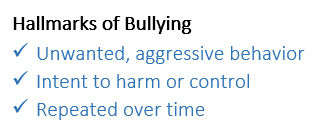How do you know if your child is being bullied or is a bully?
Bullying. The word is thrown around a lot these days. Social Health Association’s Step Up for Kindness!™ program teaches what bullying is and what it isn’t.
Bullying is defined as aggression between two or more people. It is harmful behavior that is both intentional and repetitive. It can take many forms, including physical violence, verbal abuse, cyberbullying and social isolation.
Bullying is most prevalent in late elementary and middle school. The Centers for Disease Control recently listed Indiana as the third worst state for bullying. In fact, one in 20 students in Indiana skips school because of bullying. Nationwide, one in 10 students drops out of school altogether as a result of bullying. 
The state of Indiana defines bullying as “unwanted, aggressive behavior among school-aged children that involves a real or perceived imbalance of power and is repeated, or has the potential to be repeated, over time.”
Take the bully test
It can be difficult for parents, educators and children to distinguish teasing from bullying and violence. Ask the following questions to help determine if an incident is bullying or not. 
What to do?
Sometimes children will give nonverbal cues instead of speaking up when something is wrong. They might be afraid of retaliation or rejection. They might pretend it doesn’t bother them, make a joke about it or do nothing. Others may ask the bully to stop or plan a way to fight back or retaliate.
Delivered annually to more than 15,000 Indiana students in kindergarten through 8th grade, the two-part Step Up For Kindness!™ program, teaches kindness, empathy and good character and arms students with appropriate ways to respond to a bully.
Parents and educators should be alert. Listen and be prepared to take action. Don’t ignore what a child says or write it off as “just kids being kids.” Many schools have a bullying policy and a “go to” person for reporting suspected bullying behavior, as well as an anonymous ‘bully box’ where students can leave concerns without the fear of retaliation. School administrators will work with teachers, parents and the students to assess and address the situation.

